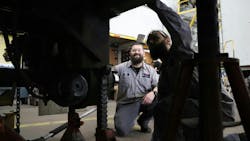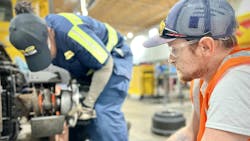Technician shadowing: Why it's important and how to get started
This is Part One of a two-part story. Click here to read Part Two.
You can look at current technician shortage statistics and feel a bit hopeless, like it’s too big of an issue for the industry to solve. Or you can remember that you’re in business because you can do the work and fix the things others can’t.
But is there really a shortage, or is retention to blame? How can you hang on to techs where others can’t? You simply need to give them a reason to stick around. Figuratively, you need to replace the revolving door at your shop with a check valve. This begins with offering competitive pay, engaging work, and strong job security. But you could really boil it down to providing a place where techs feel they belong, especially as they’re just starting their career.
It’s all too common to hear how new technicians, fresh out of school and eager to learn, get pushed into repair and maintenance tasks with little to no guidance. With this model, they need to show they belong before being accepted.
“Personally, I was pretty much just thrown to the wolves,” recalled Sean Wilkin, an emergency field service technician for Cox Automotive Mobility Fleet Services.
Older techs spent little time on the young technician. “‘This is how you do it; now do it,’” they told him.
Wilkin reflected on this strategy’s impact on newer techs like himself, noting “that’s not the best way.”
Data backs this up, as 21% of new technicians leave the industry within two years of starting their career after school, according to the National Institute of Automotive Service Excellence.
But there is another way. Instead of throwing trainees, apprentices, and junior technicians to the wolves, help them become part of the pack. That’s done with a thoughtful approach to mentorship, where the trainee has time to shadow the shop alphas and in time challenge them as top dog.
This has seemed to work at Love’s Travel Stops, where shadowing is built into the training program. Chuck Ralston, senior manager of Love’s Truck Care Academy and mechanical services, explained that new techs are required to work side-by-side with a more experienced tech for a full three months after their graduation from the training program.
“We learned quickly that you couldn’t just toss them to the wolves. We had to really help them grow,” he said. “It cut turnover exponentially. People only leave when they get frustrated about something. Nobody wants to be frustrated at work. So we give them that confidence … If you give somebody a path, they seem to stick around.”
That path may be easier to clear for some shops than others, considering the volume of jobs coming in and the size of some shops. But investing in the trainees, as well as mentors who need to be adequately compensated, is also an investment in uptime. As TMC RP 1614, “Technician mentor program guidelines,” points out, a successful mentorship program will enable higher retention—and those well-trained fledgling techs become more productive sooner. Plus, those mentors get leadership experience and a new teammate they can rely on in the future.
It’s a win for everyone, so let’s get into how you can get started.
Training tools and techniques
With the nature of the commercial vehicle industry in a constant state of change, from advancing technology to impending regulations, it’s necessary to consider every training tool available. This is especially important as technology and tools continue to modernize too, with everything from interactive online learning to augmented reality incorporated into many shops’ training programs.
Ralston discussed the addition of virtual reality to the training program at Love’s and some of the advantages that come with it. He remarked that it’s a great way to build muscle memory and test techs on preset failure points that then equate to real-world scenarios, but he also noted that nothing compares to real, hands-on experience.
“[Virtual reality] works well, but it’s such a struggle and a fight for me because I believe so much of what we do is touching; it’s feel,” he said. “I feel that the wheel bearing doesn’t spin. I feel the torque wrench click. And that’s been a battle with myself that I’ve had to get past with virtual reality.”
When it comes to actually shadowing a more experienced tech, at Love’s Truck Care “team members need to be ready to make any repairs needed,” according to Ralston. “Wheel-end repair is the one that carries the highest liability, so that’s the one we focus on the most.”
While the starting repair may vary based on shop specialty and focus, it’s apparent that watching someone else do it first is an important step
Sure, having a new tech shadow a more experienced peer as they get their hands dirty with some real repairs is typically the most straightforward and effective approach, but it’s not always feasible, especially with the nationwide technician shortage leaving shops already shorthanded.
7 steps to a successful mentoring program
- Identify the number of mentors required, as well as appropriate mentor qualifications or experience level
- Vet potential mentors to ensure they are the right candidate for the job
- Create a mentor compensation package as a participant incentive
- Develop a progress tracking and reporting system
- Put together trainee materials, like a workbook, videos, or online modules
- Train and certify mentors
- Ensure that trainees also take responsibility for learning rather than just depending on the mentor
Source: TMC Recommended Practice 1614
“Yes, there has to be a hands-on aspect of training to be a quality tech, but there are also training modules, computer-based learning, or even something as simple as a manual or a textbook,” Wilkin pointed out. “Gather that foundation, so while you’re there looking at the truck, you have something to fall back on.”
Ralston echoed this belief in the importance of traditional classroom training, especially when it comes to building a strong foundation on the basic skills.
He explained that their new technicians start with in-house produced computer-based training, the content of which has been provided by a group of trainers with over 400 years of technical experience. The information is then corroborated as they progress through their training tracking books.
The bottom line, though, is that basic skills should be the first order of business.
“[For] a newer guy, you’re going to start off on a simpler task,” said Josh Holbert, foreman at Fyda Freightliner Western Star Zanesville. “You wouldn’t just throw someone that’s fresh out of school into an electrical nightmare.”
Ray Erne, service operations manager at Transport Services, agreed on this area of struggle for many newer techs.
“Electrical troubleshooting is probably the biggest [issue], because even your most skilled technician still has a hard time with that,” he said.
The more difficult repairs need to be confronted at some point, however. Ralston noted that where electrical issues are concerned, they “try to start as early as possible in meter usage. As with most things, the best way to form good habits is to do so from the start. That’s why we use the right tools from the beginning.”
Helping new techs fit in
Technical skills are where the money is, but if a technician isn’t a good fit for the shop environment in general, it doesn’t matter how efficiently they can complete a repair.
While there aren’t any online courses that can truly convey what it means to be a part of the shop environment and a lot of this comes from being immersed in day-to-day operations, managers still have an opportunity to set the scene from the get-go.
Cox’s Wilkin recommended that for new techs fresh out of school “coming into a shop, that shop leader needs to sit them down and have a conversation about what their expectations are from the shop’s perspective and go over the types of repairs that this new tech is going to be seeing firsthand.”
This gives techs not only a baseline of what to expect, but an opportunity to speak up on any concerns or questions they might have out of the gate, avoiding confusion or conflict down the line that can disrupt shop operations.
“We teach them how to work on trucks, but we teach our culture too,” Ralston said, mentioning that part of the Love’s training program includes instruction on how to handle customers, general communication, and other soft skills.
“Sometimes if we get a new hire and they come in from a different manufacturer, just the sudden change from that manufacturer’s way of how their trucks are laid out versus ours is probably the biggest issue,” said Eric Wood, technician at Fyda Freightliner Western Star Zanesville. “But that’s usually mitigated rather quickly through online and hands-on training.”
About the Author

Lucas Roberto
Lucas Roberto is an Associate Editor for Fleet Maintenance magazine. He has written and produced multimedia content over the past few years and is a newcomer to the commercial vehicle industry. He holds a bachelor's in media production and a master's in communication from High Point University in North Carolina.

